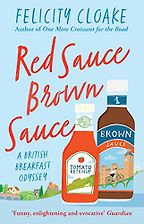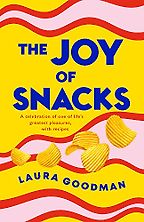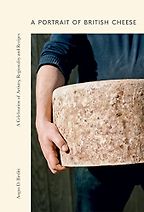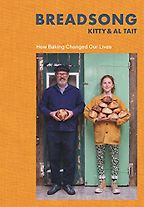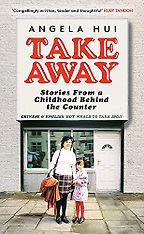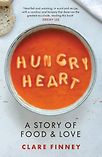Before we get to the books that made the 2023 shortlists for best food book, could you tell me a bit about the Fortnum & Mason Food and Drink Awards? What’s the prize about, what kind of books are judges picking out?
The Fortnum & Mason Food and Drink Awards celebrate the very best of food and drink writing. It is the most highly regarded prize in the UK. That’s partly the attachment to the institution of Fortnum & Mason, which is so passionate about food. Fortnum & Mason’s is integral to Britain’s culinary history and has really shaped our food landscape as we know it today.
Also—and I knew this before becoming a judge but, having now been one, it’s been confirmed—the judging process is really rigorous. Judges put hours into it. I have been a judge on other awards and it’s not the same. It’s often previous winners who are the judges for the Fortnum & Mason awards, and therefore they know what it means. They know how significant it is. And they really care. We all really, really care. You have a real sense of bestowing a great honor. I’ve been the recipient of that honor, twice. It’s made a huge difference to my career. You know that what you’re giving somebody is really transformational, even if it’s somebody as well known as Olia Hercules or Caroline Eden or even Stanley Tucci. It’s a great accolade.
We weren’t given a list of criteria. It was more, ‘What is this book setting out to achieve? Has it achieved it? How well has it achieved it?’ That was my own interpretation, but that was the sense we were given. It’s very loose, and that means you can accommodate a spectrum. That allows for new writers to come in, but it also allows for really good, longstanding writers to continue to enter and occasionally win because if Diana Henry—who’s won multiple times—continues to bang out amazing cookbooks that everyone from my youngest brother who is 25 to my grandmother, who is 92, is cooking from, she deserves a Fortnum & Mason prize. That goes without saying.
So that’s what it is and why it’s such a great prize.
Do you get a lot of entries? Are there a lot of books to choose from?
We get absolutely loads. You have all the entries and then you whittle it down to a longlist and then we all take that longlist home. I ended up taking home over 100 books. I can’t even remember how many articles I went through, as well as online recipes. It’s a huge job. But you do get some delectable Fortnum hampers as a thank you!
Let’s go through the shortlisted books. First up for the 2023 best food book award is Red Sauce Brown Sauce: A British Breakfast Odyssey by Felicity Cloake. Tell me about this book and what you like about it.
This is by Felicity Cloake, who regularly writes about food and is also an incredibly accomplished cookery writer. She does “How to Cook the Perfect…” column in the Guardian. In this book, she goes on a culinary odyssey around Britain in search of the perfect breakfast. She eats every breakfast that comes in her path: porridge, oatcakes, crumpets, the full English, the Ulster breakfast, kedgeree, kippers. You name it, she ate it. She explores the differences and the controversies. The book is peppered with little snippets of food history about different breakfast items. It has recipes as well—for example, there’s a recipe for an Arnold Bennett omelet.
She cycles from place to place. Various of her friends join her along the way, and then peel off again. Sometimes she’s on her own, sometimes she’s with a mate. It is so beautifully her. She imbues it with her incredibly warm, very funny, smart, wry but bubbling personality. By the end of it, you don’t just want to be her friend, you feel like you are her friend.
You also learn an awful lot and it’s such a nice way of learning. I’m a cyclist myself and it is an incredible way of exploring a country’s culinary landscape because you are always hungry. You can eat so much more. You just eat loads. I read her book about croissants too. That was her first cycling food book, about cycling the length of France. I really ate and read and cycled with her. It’s a very satisfying way of traveling. It’s just the perfect lens through which to explore food.
And to explore the UK?
Yes, you see it through a cyclist’s eyes. Cycling is an incredible way to explore food and to explore landscape. It makes for incredible writing because it’s as if you’re looking over Felicity’s handlebars.
The full English breakfast is one meal Brits are internationally renowned for. You miss it when you’re not in the UK.
Yes, and she really cares passionately about it. She has little stats at the end of each chapter on the number of breakfasts she’s had with red sauce and the number with brown sauce. There are also little quotes from people she’s interviewed along the way saying whether they prefer red sauce or brown sauce. The slightly ironical theme that runs throughout the book is that Felicity is neither a red sauce nor a brown sauce person, she likes mustard. She doesn’t really go for either (although she does in the end).
She also uncovers how relatively new some of these breakfast traditions are. The full English is barely 100 years old, whereas porridge and the associated oat-related breakfasts are far, far older as a tradition.
Let’s go on to the next book, The Joy of Snacks by Laura Goodman. What’s this book’s angle on snacks?
It’s really hard to put your finger on what this book is because it’s such a medley. It’s part memoir, because she talks about snacks through the prism of the memorable occasions on which she’s had them—either when she’s first experienced them or where they play a particular role in her life. So her life comes into it.
She talks about having a child. There’s a beautiful moment when she talks about having a lolly in the garden with her daughter, who’s about two years old and has started speaking. The daughter says something—I can’t remember what it was—but it was very ‘out of the mouths of babes.’ It’s a beautiful vignette. That then causes her to reflect on how difficult it’s been. She had a baby during lockdown. She doesn’t talk about this much, but she alludes to the fact that she had postnatal depression.
She had this heady life in Los Angeles before she became a mother and a lot of the snacks are born of that life, this time pre-pandemic, pre-motherhood, pre-gear change in her personal circumstances. So you get to know her quite well, even though the chapters aren’t ‘My Life in LA’ or ‘My Life as a Mother.’ The chapters are about nachos and crisps and frozen custard and lollies.
“The judging process is really rigorous”
Each snack prompts a reverie. It might be a memory, or it might be something philosophical. For example, she talks about ordering tzatziki for lunch in Greece (or Cyprus) and taking a photo because it looks so delicious. That prompts her to reflect on that constant pressure to be in the moment and whether taking a photo of something takes away from that or whether it is the most being in the moment you can be because by capturing it you keep it forever. What started off as very mundane suddenly becomes a philosophical musing. That’s beautiful.
Again, there’s a little bit of history in there. She talks about how nachos came to be, their origination in Mexico and their bastardization in various gastropubs. She writes about coffee breaks and the role of the Scandinavians in developing the cakes that we have alongside, what’s called ‘fika.’ Also, how the American habit of drinking coffee all day every day is also Scandinavian derived.
She has fun recipes. She has a lot of culinary knowledge. She’s incredibly funny. There aren’t many writers who could take on crisps and make it both meaningful and hilarious. There are some really interesting bits in there, but then there’s also a lot of levity because snacks are inherently light foods. There’s nothing serious about a snack. Her book Carbs was brilliant, but I feel like in The Joy of Snacks, she found her calling.
It’s interesting to see a book devoted to snacks: my first reaction was ‘I thought we weren’t supposed to have snacks.’
It’s funny, isn’t it? On one shortlist, you have Laura Goodman eulogizing on snacks, and then on another you’ve got Olia Hercules’s Home Food which is full of hearty meals. Olia is famously not a snacker and then you’ve got this book, which is snack central.
Let’s go on to the next book, which is one of the books shortlisted for the 2023 debut food award. This is A Portrait of British Cheese by Angus Birditt. I didn’t get a chance to look at this one, so please tell me more.
I dismissed this book initially because there are a lot of beautiful books on cheese at the moment and I thought, ‘Do we really need another one?’ But this is where the Fortnum’s award works really well because Jimi Famurewa and Tim Hayward, two of my fellow judges, had longlisted it and pored over it. When they presented it to me, I was persuaded.
It’s a very charming portrait of the British cheese scene, which is the best it’s ever been. It’s extraordinary. The portraits are beautiful. He really tells a story through his imagery. The photography is amazing. He writes through photos as much as he writes with words. He is an incredibly accomplished photographer. The book has been thoroughly researched. He’s gone around the country with his camera slung over his shoulder and captured dozens, if not hundreds, of these cheeses and the people who make them and told their story. It must have taken a phenomenal amount of work.
When it comes to the loose criteria I was talking about at the beginning—‘What has the author set out to do and have they done it and done it well?’—it absolutely fits and ticks those boxes with aplomb.
When you said there are lots of cheese books at the moment, are they books about British cheese specifically, or cheese more generally?
I’m just looking at my bookshelf. Ned Palmer won the Fortnum & Mason food award with his A Cheesemonger’s History of The British Isles. I thought that was the definitive book, written by someone very knowledgeable, but I’ve been proved wrong. Of course you can have more than one book about British cheese, and Ned’s book is very different. It’s not a photography book.
Is A Portrait of British Cheese more of a coffee table book?
Yes, you’re not going to take it on holiday.
For those who aren’t familiar with it, what’s exciting about the British cheese scene at the moment?
There have never been so many varieties. There’s a real resurgence in traditional methods of making cheese. So even if it’s a familiar cheese, there are people who are going back to pre-industrial methods of making it, using starter cultures they’ve made themselves. They’re sourcing the milk either from local farms or from their own farm and it’s not pasteurized. It’s about going back to the craft of cheesemaking. So, we now have Cheddars, Cheshires and Stiltons that taste like they would have in the 19th century. Then there are all sorts of new cheeses coming along as well. They’re either inspired by French cheeses or just their own creation entirely.
Let’s go on to Bread Song: How Baking Changed our Lives. What’s this book about?
Oh! I cried several times. This is the story of a father and daughter setting up a bakery in the village of Watlington in Oxfordshire. What gives it its narrative drive is that their baking was born out of Kitty suffering from depression at the devastatingly young age of 14. Purely by accident, her father alighted on baking as something that seemed to draw her out of it. He really captures that.
They alternate. So he writes and then she writes, and then he writes, and she writes—so you get her perspective, his perspective, her perspective, his perspective. You really get a sense of their relationship. Both have such a distinctive voice. Kitty writes beautifully, but she’s still only 16. It’s a child’s voice, but heartbreakingly so. It’s as if an incredibly accomplished author is writing a child’s voice, but instead it is actually a child’s voice, but very articulate. Her dad is a beautiful writer as well. There is so much love and tenderness in what he writes for her.
He was an amateur baker, and it just happened to be something that gradually drew her out of her depression, so they baked more together. Then she really fell for it, and her mum would take her all around the country to different bakeries to speak to bakers. She learned from them, read everything, watched YouTube. She just inhaled baking, basically. She inhaled the aroma of bread and baked more and more for her local community. Then they had pop ups and then, finally, they got their own little bakery called the Orange Bakery.
So the first half of the book is that narrative and then the second half of the book is her recipes.
It’s absolutely beautiful. It’s such an idyllic portrait of a little British village. Americans would go wild for it. It’s exactly what they imagine Britain to be—until they come…
We’re now at the fifth and final book. This is Takeaway: Stories from a Childhood Behind the Counter by Angela Hui.
This is a story of growing up in rural Wales. The impact of the closure of coal mines and deindustrialization in Wales has been profound and has left many towns and villages in a state of limbo. The industry that shaped their communities is no longer there—without a really definable new industry coming along. It’s a very specific experience and Angela captures it beautifully.
Her parents own a takeaway. They’re one of many Chinese families dotted around the country who run takeaways. Several of her uncles are also running takeaways. Having a Chinese takeaway in rural Wales is a genre of experience all of its own. It’s inimitable.
The book captures a lived experience, a slice of history. It feels like an important story that’s been told, and she’s told it very well. It’s a very moment-in-time book. It’s rooted in time and place and is very evocative of that time and place.
“Fortnum & Mason’s is integral to Britain’s culinary history”
It’s about the challenges of difference, of being one of the only Chinese people in the village. But there’s also the sense of a community that comes together when all of her family meet in Chinatown in Cardiff. Then they’re all together and they’re the norm rather than the other. It talks about her trips to Hong Kong every summer where they would buy all the ingredients that they couldn’t get in Cardiff.
The book talks about the big Asian supermarket in Cardiff, and the wide-eyed wonder of being a child in these huge markets built for caterers. My grandparents owned a hotel and so I also remember going round these wholesale supermarkets with the kind of trolleys you get in garden centers and just piling huge sacks of flour on. I really related to that.
It’s an incredible insight into what it must have been like. She has a loving, but tense, relationship with her father. They spent so much time at the takeaway. It was a family affair. It wasn’t just her parents: her brothers and her were roped into service. She felt quite estranged from her friends, not just in terms of her identity, but because of the time that she spent at the takeaway. All her spare time was filled by working there. It’s a very moving memoir, peppered with delicious meals.
Also, when you think of food books, you don’t think of takeaways as a major topic.
Yes. It really gives a grittiness that you’re not going to find in many food books. But it’s a grittiness that you can savor. Felicity Cloake, in Red Sauce Brown Sauce, talks about going back to a McMuffin. You expect her to hate it, but she loves it, because they’re disgustingly delicious. Angela talks about a teenager coming in and ordering chips and egg fried rice with curry sauce. She describes it and you’re like, ‘Oh, I really want chips and curry sauce and egg fried rice, right now!’ There’s a real place for foods that we know we shouldn’t have or shouldn’t have very often. We’ve gone down that rabbit hole and there they are and there’s no undoing them.
We’ve talked about the five food books on the 2023 shortlists, could you tell me about the other Fortnum & Mason awards you’ve been judging?
There’s the cookbook award for established cookery writers, the debut cookbook award, the drinks book award and the debut drinks book award. And then we judged awards less relevant for your readers: food writer, debut food writer, cookery writer and debut cookery writer, drinks writer, debut drinks writer. And there are podcasts as well.
Before we finish, you also have a new book coming out on June 8th called Hungry Heart. What’s that about?
It’s about food and love in all its many forms. It’s not just romantic love, it’s familial love, it’s friendship, it’s your colleagues, it’s yourself. It’s school food and funeral food. It’s the food you have after breakups and the way in which divorce shapes how you eat. It’s all the food and all the love I’ve experienced in my relatively short life.
So it’s my story, but with other people’s stories woven in. I’m providing a narrative thread and then there are interviews with Diana Henry and Bee Wilson, with Olia Hercules and her husband, with friends of mine, with Lauren Bravo—an amazing fashion writer—with a kitchen designer, a psychologist and with a food historian.
Had nobody explored the theme of food and love before?
Not that I could find! Food and sex have been very much done, but there’s no sex in my book. That’s very obvious from the cover because it’s got alphabetic spaghetti on it.
Interview by Sophie Roell, Editor
May 7, 2023. Updated: July 6, 2023
Five Books aims to keep its book recommendations and interviews up to date. If you are the interviewee and would like to update your choice of books (or even just what you say about them) please email us at [email protected]
Five Books interviews are expensive to produce. If you've enjoyed this interview, please support us by donating a small amount.
